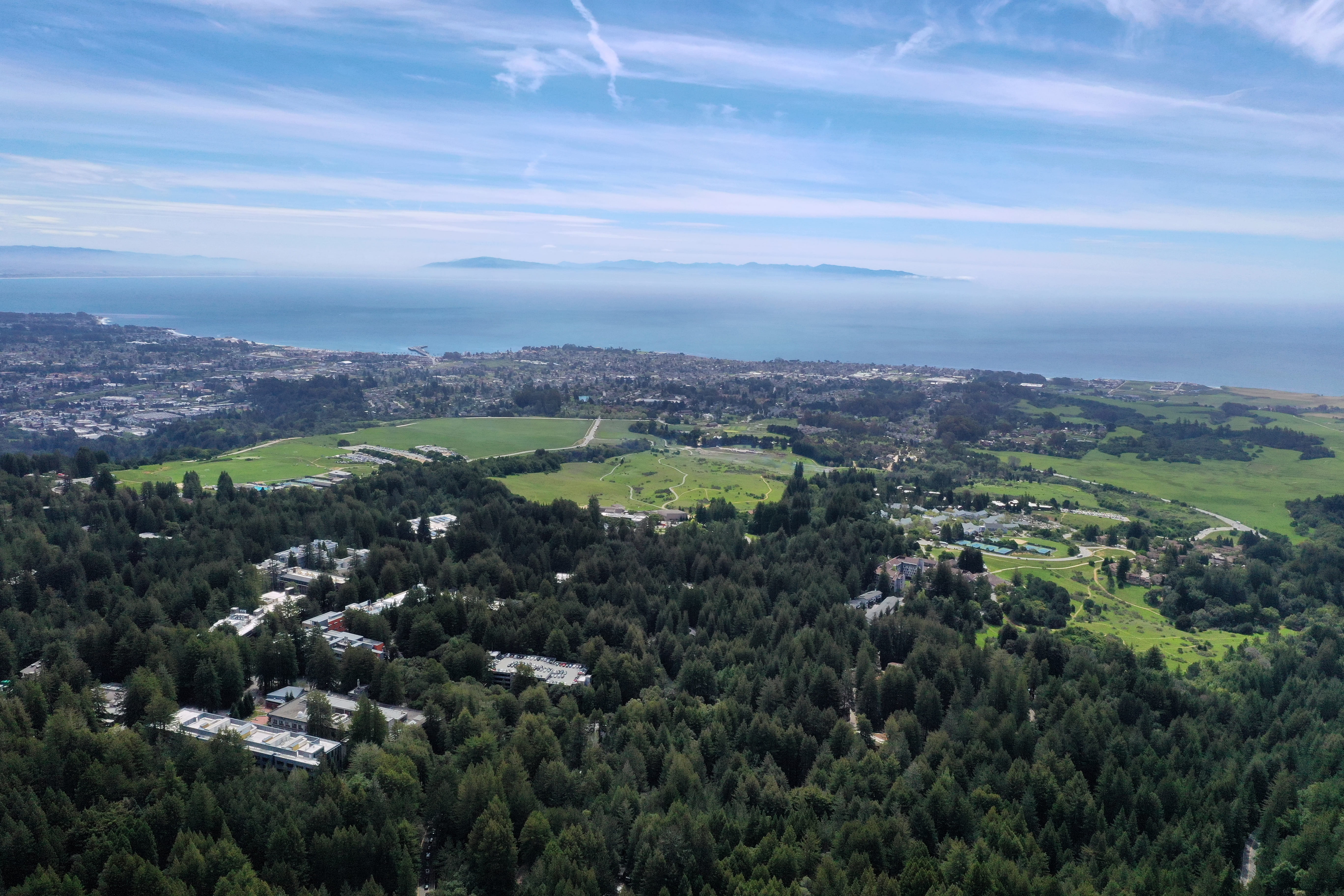
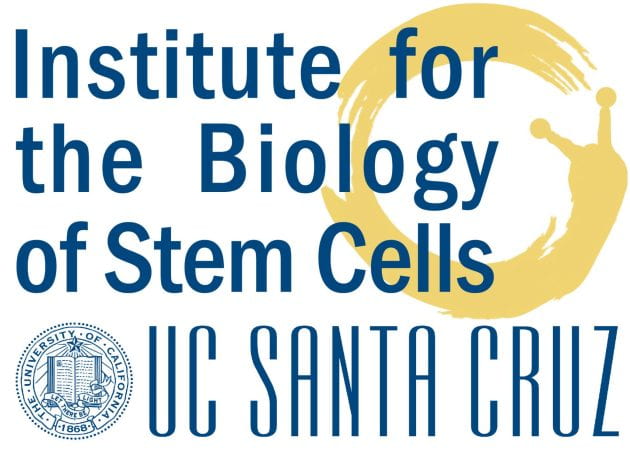
In this issue
| UC-HSI-DDI Doctoral Diversity Initiative | Novel Deep Learning Tool for Stem Cell Biology | New CIRM Funded Stem Cell and Neuroscience Research |
| New UC-Cinvestav Funded Prion Research | Undergraduate Research Experiences for CSU Students | USPA Hosts Successful Symposium |
| Training Programs – Call for Applications | Newly Published Research | New Ph.D. Graduates |
UC-HSI-DDI Doctoral Diversity Initiative
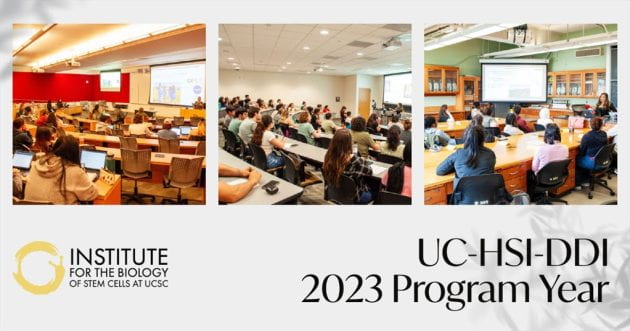
UCSC Ph.D. Students Address CSU Undergraduates at Four CSU Campuses
The IBSC’s UC-HSI-DDI Program welcomed its second year with a new cohort of four Ph.D. seeking graduate students: Amanda Carbajal (Camps Lab); Cynthia Ramirez (Sikandar/Jonsson Labs); Diana Escalona (Carpenter Lab); and Rafael Robles (Partch Lab). These fellows visited CSU Monterey Bay, San Francisco State University, CSU East Bay, and CSU Stanislaus. At these different locations, the students provided over 200 CSU undergraduate students a look at their “paths to a Ph.D.”, and the challenges they faced and overcame. Interested CSU students were encouraged to meet 1:1 with the UCSC presenters to learn more about available resources and the ways they can chart their own journeys to graduate school and beyond.
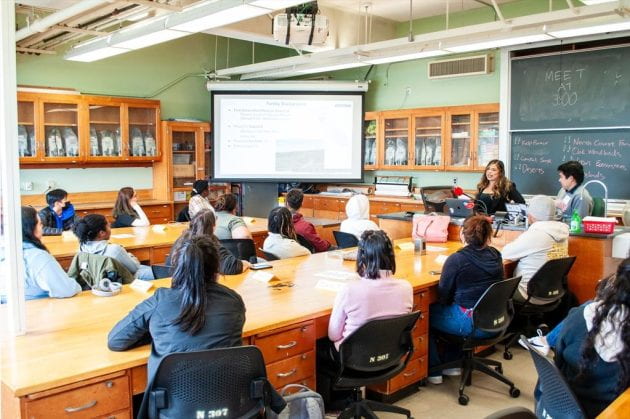
With these sessions, CSU students start to build network connections that will help them at every stage of their journey. The program’s goal is to encourage CSU students to consider becoming the next generation of faculty and researchers at UC and CSU campuses. To reduce barriers, the IBSC UC-HSI-DDI program has secured graduate school application fee waivers for CSU students applying to UCSC for graduate school.
As part of the UC-HSI-DDI outreach initiative, this year’s cohort of UCSC graduate students will also attend and present their current research at the upcoming SACNAS and ABRCMS conferences. If you plan on attending one of these conferences, be sure to stop by their posters and say hello!
Developing Novel Research Analysis Tools
Shariati Lab Launches Deep Learning-based Software for Cell Segmentation and Tracking
Time-lapse microscopy has allowed researchers to investigate cellular growth and division for decades. Modern scientific studies utilizing this technique generate huge amounts of data that require many hours of processing and analysis; an often seemingly impossible task particularly when factoring in intra-operator and inter-operator variability and error.
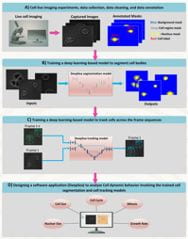
Recently described in a paper published in Cell Reports Methods, the Shariati Lab in the Department of Biomolecular Engineering and Institute for the Biology of Stem Cells developed a novel, user-friendly, open-source deep learning tool to tackle this type of analysis. Called “DeepSea,” this software tool allows researchers to train a deep learning model for any cell type of interest, segment and track these cells, and detect their division to further trace their lineages.
The Shariati lab plans to employ DeepSea analysis to investigate spatial relationships between cells and to determine how cellular features are organized in 3-D patterns to form structures. They will continue to develop this new resource so that it will help researchers resolve bottlenecks in deep learning models, with the ultimate goal being to provide researchers with large dataset libraries for any cell type of interest with minimal human involvement. Considering this current deep learning model can already perform segmentation in less than one second and track cells with ~98% accuracy, future improvements will only add to its utility in advancing discoveries in stem cell biology.
NEW CIRM Funding for Stem Cell and Neuroscience Research at UCSC
Max Haeussler To Develop Novel Open-source Research Tool for Human Cerebral Cortex
CIRM recently awarded ~$1.1M in funding to Dr. Max Haeussler, a member of the IBSC and the UCSC Genomics Institute. Haeussler’s team will utilize this funding to develop a user-friendly database focused on the developing and diseased human cerebral cortex. This interactive data resource will enable users to test hypotheses generated by the analysis of single stem cell gene expression and validation of the results with stem cell-derived brain organoids. This cool new tool, freely accessible from the CIRM Stem Cell Hub, will provide an enhanced open-source resource for the global research community.
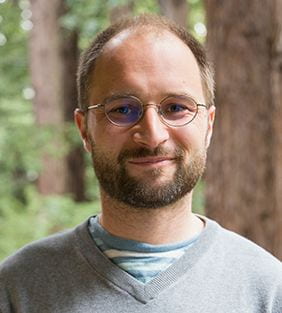
Title of award: “An interactive data resource for hypothesis testing in stem cell single-cell gene expression and validation of the results with brain organoids”
Camilla Forsberg and IRACDA Postdoc Bryce Manso Will Investigate Platelet Production From Stem Cells
IRACDA Postdoc Bryce Manso and IBSC Co-Director Camilla Forsberg were recently awarded ~$1.5M in funding from CIRM in support of a project to determine how heterogeneity of human hematopoietic stem cells and megakaryocyte progenitors contribute to thrombotic disease during aging.
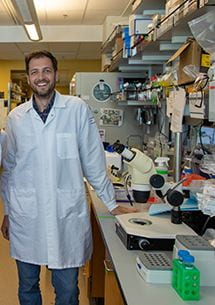
This project will investigate the connection between aging and platelet production and how changes in age-related platelet production can lead to blood clots, stroke, and cardiovascular disease. T32 Postdoctoral Fellow Saran Chattopadhyaya also contributed to the proposal as well as other members of the Forsberg lab and collaborators within UCSC and at Stanford University. In addition to providing ongoing research and career training, the goal of this study is to develop improved treatment strategies for blood clots, stroke, and cardiovascular disease.
This funding and the collaborative process involved in obtaining it showcases the career development and community support provided by the IRACDA post-doctoral training program.
These new grants and the research that will be supported came from team efforts, which can be overlooked when reading headlines that only include the PI and co-investigator(s). We are extremely fortunate at UCSC to have a strong and diverse community that supports researchers at every career level, enabling them to successfully compete for these types of grants.
New Funding for Prion Research
IRACDA Mentor and Collaborators Receive UC-Cinvestav Funding
The UC Alianza MX promotes the role of the University of California as Mexico’s primary institutional research and scientific partner, and supports largescale, high-impact research projects that will advance California-Mexico collaboration.
Current IRACDA Mentor and Distinguished Professor Glenn Millhauser, in collaboration with David Britt (UC Davis); Liliana Quintanar Vera (Cinvestav Zacatenco); and José Segovia Vila (Cinvestav Zacatenco) received funding to perform ex-vivo and in-vitro spectroscopic studies of ternary copper-prion interactions. This research aims to shed light on the role of copper in binding prion and other proteins that undergo proteolytic processing and self-propagating, pathological misfolding. It is anticipated that understanding this disease mechanism will bring new insight into neurodegenerative disorders such as Alzheimer’s disease. This collaborative project is being performed at UC Santa Cruz, UC Davis and the Center for Research and Advanced Studies of the National Polytechnic Institute in Mexico City.
Providing Undergraduate Research Experiences
GAIN Program Launches Third Program Year
The Genentech Academic Inspiration Network (GAIN) Program entered its third year with a new cohort of Postdoctoral Mentors who will provide research mentorship and lab experiences to CSU undergraduate students. Camila Ideli Morales Fenero (Kimmey Lab); Jessica Sevetson (Salama-Haussler Lab); and Shuai Hu (Otteman Lab) will mentor and support the graduate school and STEM career goals of six CSU undergraduates this summer.
The GAIN program pairs CSU undergraduates with a UCSC Postdoctoral mentor and provides laboratory supply funds in support of a two-month Summer Research Internship. Because research opportunities are quite limited at CSUs, these internships are particularly valuable for CSU undergrads who wish to pursue graduate programs. Past CSU undergraduate participants have gone on to present their research at the CSU Monterey Bar Fall Research Symposium and the CSUperb Research Conference. Combined with the UC-HSI-DDI Program, these and other undergraduate research opportunities help build a true bridge from undergrad to Ph.D. and beyond. By providing mentors, peers, and program funding, this summer internship opportunity is designed to help students who may not be aware of resources that can enable the path to graduate school.
UC Santa Cruz Postdoctoral Association (USPA) Hosts Another Successful Symposium at Long Marine Lab
IBSC Fellows Organize and Present Symposium With the IBSC Providing Sponsorship
The USPA organized another great Symposium, the seventh in a row, with terrific keynote speakers, as well as short talks and poster presentations from post-doctoral fellows. Dr. Harmit Malik attended the event from the Fred Hutchinson Cancer Research Center. As an investigator for the Howard Hughes Medical Institute, Dr. Malik’s lab studies the competition between genes and proteins with opposing functions. His talk entitled “Molecular Arms Races Between Host and Viral Genomes” addressed this conflict, which drives evolutionary processes governing our body’s interactions with external invaders such as viruses. From UCSC, Astronomy Professor Enrico Ramirez-Ruiz dazzled the audience with images of the universe and spoke about our role on earth (and beyond). Also from UCSC, Nada Miljkovic, an artist and educator who is also a project manager at the UCSC Center for Innovation and Entrepreneurial Development, discussed the art of leadership.
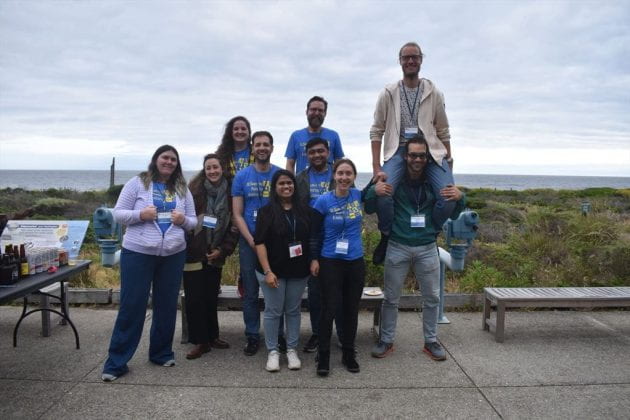
There were many marvelous post-doctoral talks including those from several IBSC fellows: Bryce Manso, Alka Gupta and Rachel Kerslake. Other fellows, including Cristina Flores-Arenas and Alison Mills, presented at the poster session. A remarkable feature of the meeting was the breadth of science on display from imaging planets and monarch butterfly supergenes to paternal epigenetics and vaccine design.
Altogether, the day was a huge success with many IBSC post-doctoral fellows actively involved in making it so, particularly T32 post-doctoral fellow Brian Mullen who served as the USPA Symposium co-chair. Kudos to the USPA!
Postdoctoral and Predoctoral Training Programs
Applications now open for January 1, 2024 Start
The Institute for the Biology of Stem Cells at UCSC is thrilled to announce a new call for applications for the upcoming year:
The IRACDA, T32, and CIRM Postdoctoral Training Programs will be accepting applications through August 31 for the next Training cohort scheduled to start January 1, 2024.
Similarly, the CIRM Predoctoral Training Program will be accepting applications through October 1st for consideration for the next Training cohort also scheduled to start January 1st, 2024.
All Application Materials for each program can be found on the IBSC’s Website under Application Materials (see the top navigation bar). Additional information for each training program can be found on its respective page and by following the links below:
- IRACDA Postdoctoral Training Program – Geared for academic career paths with teaching/pedagogy training.
- T32 Postdoctoral Training Program – General biomedical research training.
- CIRM Postdoctoral Training Program – Regenerative medicine and biomedical research focused with career development activities geared for industry, non-profit, and foundation career paths.
- CIRM Predoctoral Training Program – supports Ph.D. students with additional career development activities aligned with CIRM research goals.
Newly Published Research
The IBSC is home to a myriad of labs working on stem cells from different perspectives encompassing molecular, cell, and developmental biology; biomolecular engineering; chemistry and biochemistry; microbiology and environmental toxicology; applied mathematics and more. We are thrilled to announce the following scientific manuscripts recently accepted for publication:
- Horton, Corrigan; Liu, Yueli; Wang, Jiawen; Green, Jonathan; Tsyporin, Jeremiah; Chen, Bin
- Wang, Zhu. Modulation of the canonical Wnt activity by androgen signaling in prostate epithelial basal stem cells. Stem cell reports. 2023 Jun;18(6):1355–70.
- Martin, Eric; Rodriguez Y Baena, Alessandra; Reggiardo, Roman; Worthington, Atesh; Mattingly, Connor; Poscablo, Donna; Krietsch, Jana; McManus, Michael; Carpenter, Susan; Kim, Daniel; Forsberg, Camilla. Dynamics of Chromatin Accessibility During Hematopoietic Stem Cell Differentiation Into Progressively Lineage-Committed Progeny. Stem Cells. 2023 May;41(5):520–39.
- Weiser, Sydney; Mullen, Brian; Ascencio, Desiderio; Ackman, James. Data-driven segmentation of cortical calcium dynamics. PLoS Comput Biol. 2023 May;19(5):e1011085.
- Zargari, Abolfazl; Lodewijk, Gerrald; Mashhadi, Najmeh; Cook, Nathan; Neudorf, Celine; Araghbidikashani, Kimiasadat; Hays, Robert; Kozuki, Sayaka; Rubio, Stefany; Hrabeta-Robinson, Eva; Brooks, Angela; Hinck, Lindsay; Shariati, Ali. DeepSea is an efficient deep-learning model for single-cell segmentation and tracking in time-lapse microscopy. Cell Reports Methods [Internet]. 2023 Jun 23; Available from: https://doi.org/10.1016/j.crmeth.2023.100500
ConGRADulations to New Ph.D.’s
The IBSC would like to extend a heartfelt congratulations to all graduating students and are particularly excited to announce the graduation of the following students who recently completed their Ph.D. and are off to their next scientific adventure:
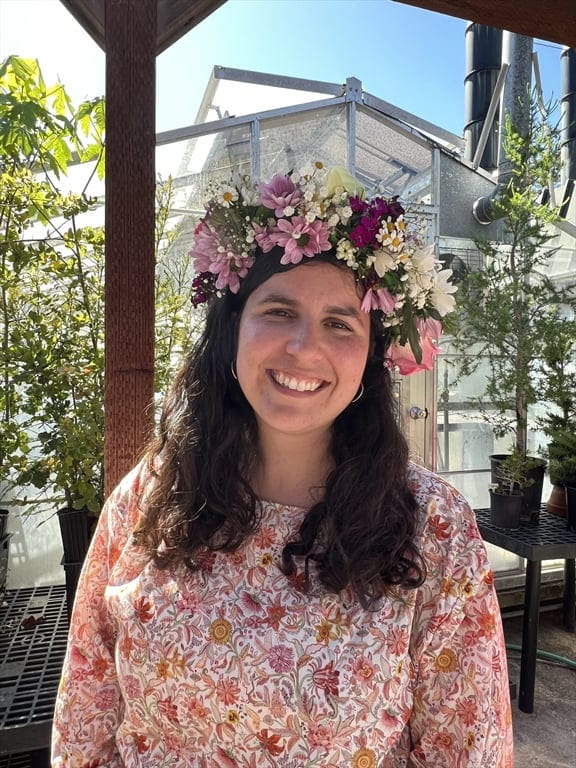
Atesh Worthington, Ph.D. – Forsberg Lab, Biomolecular Engineering
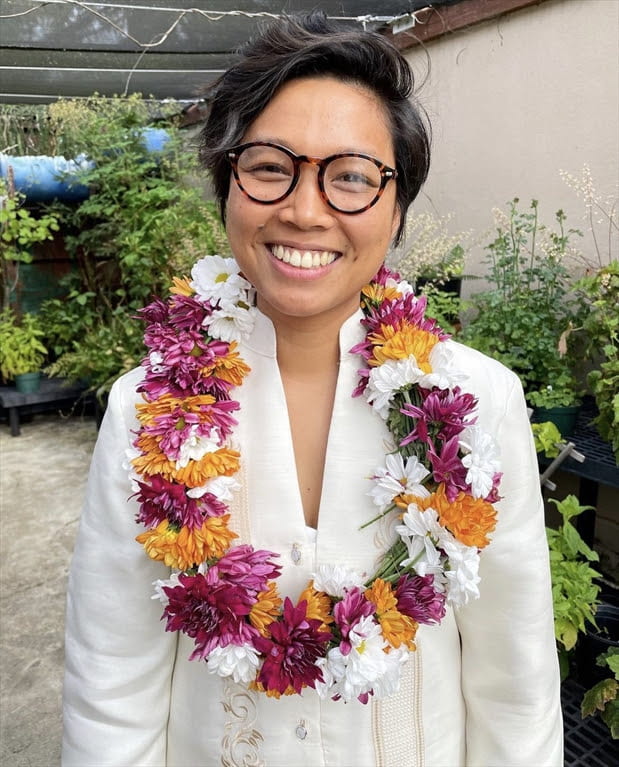
Donna Poscablo, Ph.D. – Forsberg Lab, Biomolecular Engineering
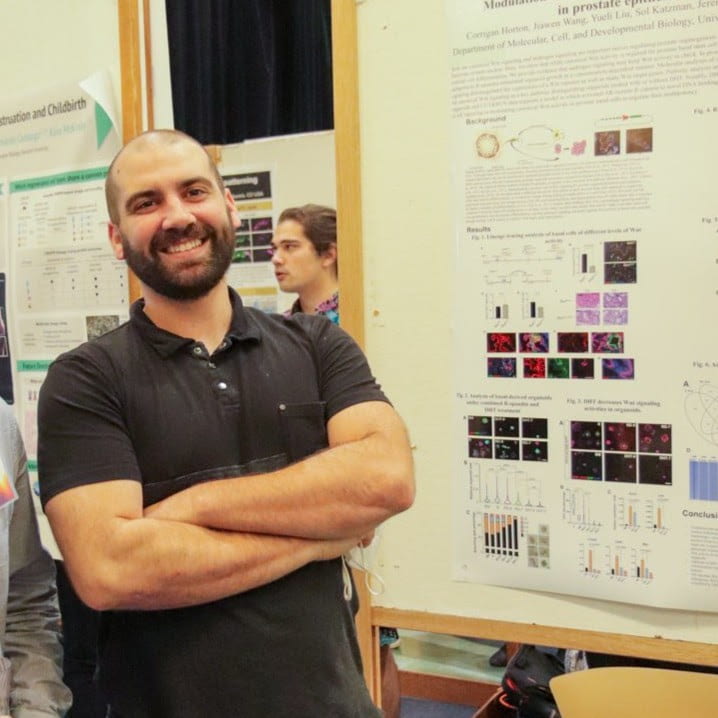
Corrigan (Cory) Horton, Ph.D. – Wang Lab, Molecular, Cell and Developmental Biology
